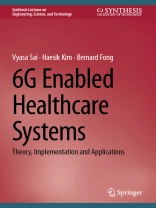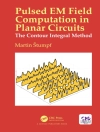This book introduces 6G enabled healthcare systems and helps readers understand state-of-the-art techniques and applications for future healthcare systems. Readers will be able to obtain a background knowledge about AI, wireless systems, implementation methods, and applications, enabling the upcoming migration from 5G to 6G for supporting mission-critical healthcare applications.
Daftar Isi
Chapter 1 Introduction to 6G Enabled Healthcare Systems.- Chapter 2 6G techniques.- Chapter 3 AI techniques.- Chapter 4 Io T system and Implementation.- Chapter 5 Role of Io T in Healthcare systems: Application and Implementation.- Chapter 6 KPIs, use cases and applications for 6G healthcare systems.- Chapter 7 6G enabled healthcare systems.
Tentang Penulis
Vyasa Sai is a Senior Hardware Engineer in the Accelerated Computing Systems and Graphics Group (AXG) Group @ Intel Corporation, Folsom, CA, USA. He received his Ph D from the Department of Electrical and Computer Engineering (ECE) at the University of Pittsburgh, Pittsburgh, PA, USA in 2013. He also has a Master of Science degree in ECE and a Bachelor of technology degree in ECE from USA and India respectively. He is both a published author with numerous refereed international publications in the field of electronics and communication engineering and a published inventor with several US patents to his name. He is the IEEE Chair for the Com So C Sacramento Valley Chapter, Lead series editor for the Design and Implementation of Devices, Circuits, and Systems Series for IEEE Communication Magazine, Technical Committee member for the IEEE Circuits and Systems for Communications and actively participates in various international journals and conferences by serving as a Session Chair, Review Committee Member, Lead Guest Editor, Technical Committee member, etc. His research contributions and accomplishments have won him many international honors that include 2018 Williams award, 2020 Sheth International Achievement award, 2022 Young Scientist Award, among others.
Haesik Kim is a project manager in VTT Technical Research Centre of Finland. He received the Ph.D. degree from Lancaster University, UK. From 2002 to 2006, he was with Samsung Advanced Institute of Technology (SAIT) where he focused on physical layer system design and standardisation in 3G, SDR and UWB projects. From 2008 to 2009, he was with NEC UK where he was involved in 4G Wi MAX system design and standardisation. He was a visiting researcher at the University of Bergen, Norway and National Institute of Information and Communications (NICT), Japan. He joined VTT Technical Research Centre of Finland in 2010 and is currently focusing on system design and optimization for 6G. He has over 20 years work experience from 3G to 6G. He is an author of multiple wireless system books: Wireless Communications Systems Design (Wiley), Design and optimization for 5G wireless communications (Wiley-IEEE), and AI for 6G (Springer). These books are widely referred to in academia and industry. He is now serving as an associate editor of IEEE Transactions on Consumer Electronics and an associate technical editor of IEEE Communications Magazine. He was a vice-chair of 5G-IA steering board. He was a series editor of IEEE Communications Magazine: Design and Implementation of Devices, Circuits and Systems. He has been serving as a guest editor, a conference chair, a session chair and a TPC member of major IEEE journals and conferences such as JSAC, ICC, GC and so on. He as an EU project coordinator, project manager and principal investigator has been involved in many research projects: EU, ESA, Finnish national projects. His current research interests include artificial intelligence, machine learning, 6G communications and networks design and optimization, vertical use case designs, etc.
Bernard Fong received his BSc degree in electronics from the University of Manchester Institute of Science and Technology and Ph D degree in health information systems from the University of New South Wales in 1993 and 2005, respectively. He is currently with Providence University and serves as the Managing Editor of IEEE Smart Cities e Newsletter, associate editor for the Archives of Emergency Medicine and Critical Care, Anaesthesia, Critical Care and Pain Management; Cyber-Physical Systems, and Academic Editor of PLOS ONE. He is the Chair of System Biology and Biomedical Systems Technical Committee under IEEE Systems Council.












